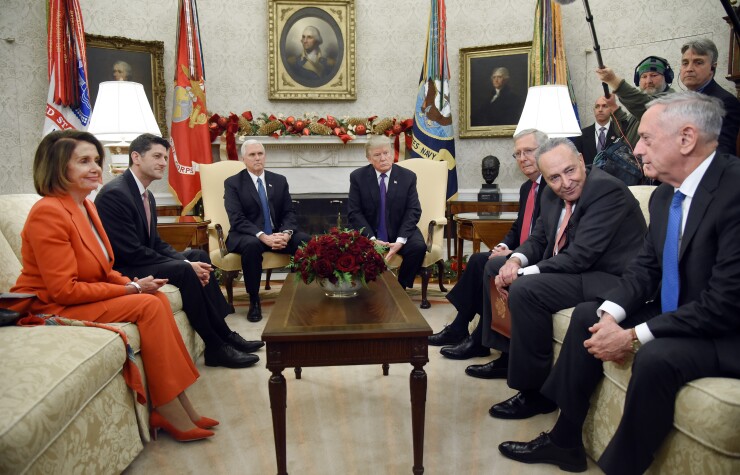WASHINGTON — The midterm
With Republicans still
“Democratic oversight [in the House] will be, ‘Regulators are going too far in loosening oversight,’ ” said Brandon Barford, a policy analyst at Beacon Policy Advisors. He added that the upper chamber will urge the agencies to continue writing rules under the regulatory relief law passed last spring. “Republican oversight in the Senate is going to be, ‘You’re not moving fast enough to implement S 2155.’”

If the GOP had held on to power in the House, the industry could have hoped for more momentum on the reg relief front. But the recent Senate law making targeted changes to the Dodd-Frank Act, which President Trump signed in May, may be the last major piece of financial services legislation for the foreseeable future.
“I don’t think there’s going to be much legislation in a divided government situation,” said Aaron Klein, economic studies policy director at the Brookings Institution. “S 2155 represents the kind of high watermark of bank legislation under the Trump administration."
Klein said the Trump administration, which could try to encourage the two chambers in the direction of bipartisan reform, has not shown much interest in smoothing over divisions.
“What’s lacking in legislation is that there is no consensus builder in the White House," he said. "In order to have bipartisan legislation, which is the vast majority of banking bills, you need to have an environment that is conducive to substantive conversations that will identify areas of consensus … and satisfy diverse constituencies. President Trump has not shown that much of an ability to do that.”
The new Democratic House majority means that Rep. Maxine Waters, D-Calif., who is an ardent opponent of Trump, will likely hold the gavel on the Financial Services Committee. Observers expect her to focus on oversight of the Trump administration’s regulators, conduct hearings with troubled financial institutions, and probe firms associated with Trump and members of his family.
“With a divided Congress, we would expect a legislative logjam, a forceful oversight agenda in the House, a steady pace of confirmations in the Senate, and a slow lurch from deadline to deadline on Capitol Hill,” said Jaret Seiberg, an analyst at Cowen Washington Research Group, in a note Monday.
Cliff Stanford, who chairs Alston & Bird's bank regulatory group, said the difficulty facing House Democratic leaders in moving legislation will result in their focusing on an "oversight role.
"Maybe that’s just a natural result of having a different party in the White House,” he said.
While divided government is likely to produce legislative gridlock, there are still several key regulatory posts that haven’t been filled by the Trump administration that need Senate confirmation. The Federal Reserve Board of Governors still has three empty seats, although a vote on the Senate floor has been scheduled for one nominee, Michelle Bowman. The Senate has not yet voted to confirm Kathy Kraninger to head the Consumer Financial Protection Bureau. And Mel Watt’s term as Federal Housing Finance Agency director is up in early 2019.
With Republicans poised to expand their majority in the Senate as votes continued to be counted into Wednesday, the Trump administration could have a slightly easier time to pushing through regulatory nominees that reflect the administration’s overall view that financial services firms need relief.
“You are going to have a tremendous amount of oversight from both chambers, but in the Senate, you would have an impact on appointments,” said Klein.
However, while a big bipartisan legislative package affecting financial services is unlikely, some observers say the divided-government reality could motivate Republicans and Democrats in the House and Senate to compromise on smaller reforms, particularly in areas relating to the current anti-money laundering laws and the fintech regulatory landscape.
“I think there are some kernels of opportunity out there for reform in a bipartisan fashion,” said Stanford. “The anti-money-laundering and beneficial owner legislation is one of those where there is bipartisan support to do some of those.”
Isaac Boltansky, director of policy research at Compass Point Research & Trading, said in a research note Monday that there is a "small subset of issues" such as fintech and privacy-related reforms "that could conceivably gain sufficient bipartisan support for targeted legislation.”
And marijuana banking may be another issue that lawmakers of both parties could try to come together on, as more states push to legalize the substance — for medicinal or recreational purposes — but the Justice Department is still enforcing a federal ban. Banks and credit unions are often cautious in providing services to cannabis-related businesses given potential legal ramifications and conflicts between federal and state laws.
“Right now you have over 31 states and the District of Columbia where marijuana is legal in some form,” said Paul Merski, group executive vice president for congressional relations and strategy at the Independent Community Bankers of America. “I really think the grassroots pressure to do something will grow next year. A lot of the states want to safely collect the tax revenue that’s associated with that.”
Klein said the issues surrounding legal cannabis may transcend political concerns.
“A lot of it’s a function of age,” said Klein. “If you look at national surveys about cannabis and marijuana criminalization, they are more correlated with age than party.”
But there will be a tight window for Congress to pass smaller bipartisan reforms as the conclusion of the midterms will inevitably give way to more attention on the 2020 presidential contest. Democratic candidates will likely include several members of Congress who are exploring a run, such as vocal Senate Banking Committee Member Elizabeth Warren, D-Mass.
A focus on 2020 will likely make it even harder to pass financial services legislation.
“Next summer is kind of the key window,” said Barford. “If they can choose to do something next summer and into the fall, that is the window.”





